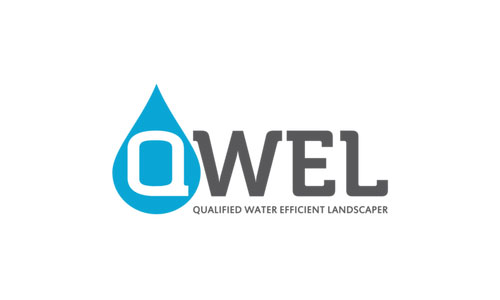For the eco-conscious homeowner, turning to a Qualified Water Efficient Landscaper (QWEL) to transform your yard represents a commitment to sustainability. Their knowledge and practices are an investment that goes beyond curb appeal to foster a healthier, more water-wise community. Your personal green initiatives will serve as a blueprint for a greener, more sustainable tomorrow. Let’s learn more about the importance of working with a QWEL professional to create a beautiful and water-efficient landscape.
What is QWEL and Why it Matters
The Qualified Water Efficient Landscaper (QWEL) certification is a program designed to educate professionals in the landscaping, irrigation, and yard maintenance industries on best practices for water conservation. QWEL courses cover topics such as local climate-related water budgeting, irrigation system components and maintenance, soil moisture management, and landscape water use.
Candidates for QWEL certification undergo an intensive 20-hour course that equips them with the knowledge to design, install, and maintain sustainable landscapes. Going well beyond lawns, landscapers learn complex irrigation techniques for diverse plant life, such as trees, shrubs, and native species, giving them the tools to create thriving ecosystems that use water efficiently.
How QWEL Transforms Your Yard and Community
A QWEL professional has the expertise to reduce water consumption without compromising the health or beauty of your yard. They can assess and redesign your current landscape to minimize water waste, often utilizing water-efficient plants, xeriscaping principles, and the latest in smart irrigation technology.
QWEL landscaping has a ripple effect on your neighborhood. As more yards in a community become water-efficient, the impact on local water resources can be significant. QWEL-certified professionals are not just creating individual oases of sustainability but are part of a wider movement to conserve water at a community-wide level.
QWEL Landscapes Cut Costs without Cutting Corners
What homeowners will likely be surprised by is that a QWEL yard can significant lower utility costs by creating a lush landscape that doesn’t drain your wallet through high water bills. The initial investment in a QWEL design will often pay for itself over time, making it a financially sensible choice for the environmentally minded homeowner.
QWEL landscapes are not only sustainable but also surprisingly beautiful. QWEL professionals understand the art and science of combining native plants, drought-resistant species, and water-conserving techniques to create colorful, diverse narratives in your yard. The result is not just a garden that looks green but is genuinely part of a water-wise ecosystem.
One of the most compelling aspects of a QWEL landscape is its resilience in the face of changing climates. By using regionally appropriate plants and irrigation strategies that adapt to seasonal variations, QWEL landscapes can withstand droughts and water restrictions while still thriving.
The Future of Sustainable Landscaping
Whether you’re starting from scratch with a new yard or looking to retrofit your existing landscape, a QWEL professional can help turn your vision into a reality and lay the foundation for the environmental legacy we pass on to future generations.
Furthermore, construction firms, real estate developers, and municipal planning departments are increasingly seeking QWEL-certified professionals to ensure their projects reflect the latest in water efficiency standards in your communities.
Your Garden, Your Legacy
Working with a QWEL landscaper is a testament to your commitment to a sustainable future and a thriving planet. The decision to engage a QWEL-certified landscaper is a move toward a smarter, more responsible use of one of our most precious resources. Transforming your yard into an oasis of water efficiency will ensure that you’re part of the growing movement that values ecological well-being alongside personal comfort and beauty. Now is the time to implement water wisdom in your very own surroundings.

